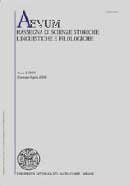Monica D'Agostini
Titoli dell'autore
King, Queen, and Greek cities. Polycratia
and Philip V
digital


Anno:
2022
In Asia Minor, an inscription from the Carian sanctuary of Panamara, I. Stratonikeia 3, honours the king, Philip V of Macedonia, with his queen, basilissa, and their children. The document sheds light on the king’s wife and contributes to the interpretation of the literary tradition on Philip’s marriage. By examining the Anatolian epigraphic record, this paper collects and analyses the available evidence on the king’s dynastic politics...
€ 6,00
Da Fila a Ftia di Macedonia. Riflessioni sulla regalità femminile degli Antigonidi
digital


Anno:
2020
Building on literary and documentary evidence this paper focuses on third-century Hellenistic queenship and its relation with coeval monarchic institutions. It considers the Antigonid instances of queenship, from Phila I to Phthia of Macedonia, to explore the history of the status of the Hellenistic basilissa as well as of the title used to identify it...
€ 6,00
The Multicultural Ties of the Mithridatids:
Sources, Tradition and Promotional Image of the Dynasty of
Pontus in 4th-3rd Centuries B.C.
With an Appendix on the Earliest Issues of Pontic Coins and
Laodice III’s Dowry
digital


Anno:
2016
The relationship between the kingdom of Pontus and the kingdoms of the successors in 4th-3rd c. B.C. had the appearance of an intricate web of ambiguous ties, propagandist, dynastic and political, and culminated in the wedding of Antiochus III with Laodice, the daughter of Mithridates II: in this occasion Polybius (V 43, 1-4) highlights the Mithridatids’ nobility with reference to the Seven Persians that established Darius I. Nevertheless, Diodorus and Plutarch also link the Mithridatids with a dynasty of Cyus in Mysia, and attribute to the Macedonian Demetrius Poliorcetes a major role in the foundation myth of the Pontic kingdom...
€ 6,00
Filippo V e la Storia Romana di Appiano
digital


Anno:
2011
SUMMARY: The extant 10 fragments of Appian’s Macedonian book, concerning Philip V of
Macedonia, and their sources are analysed. It has been observed that often Appian’s books on
Syrians, on Illyrians, on Macedonians include information alien to the Roman point of view, as
it is attested in the historiography of Polibian traditions. The non-Polybian source for these
fragments is investigated and its peculiarities are singled out. It appears that Appian attempts to
counterbalance Polybius’ Roman standpoint with a more Macedonian-Greek perspective, which
often transmits the defeated’s point of view. This source, basically Greek, is hostile to the Aetolians,
critical of the Attalids, and unbiased to the Macedonians; it has certainly read Polybius,
and is well informed on the 3rd/2nd-century politics.
€ 6,00
Consulta l'archivio
Articoli Open Access
Ultimi 3 numeri
Sant’Agostino d’Ippona a Pavia da tredici secoli: reliquie, eredità culturale e spirituale, attualità. Aevum - 2025 - 1 (Supplemento)
AEVUM - 2025 - 1
AEVUM - 2024 - 3
AEVUM - 2025 - 1
AEVUM - 2024 - 3
Annate disponibili online
202520242023202220212020201920182017201620152014201320122011201020092008200720062005200420032002200120001999199819971996199519941993199219911990198919881987198619851984198319821981198019791978197719761975197419731972197119701969196819671966196519641963196219611960195919581957195619551954195319521951195019491948194719461945194419431942194119401939193819371936193519341933193219311930192919281927









